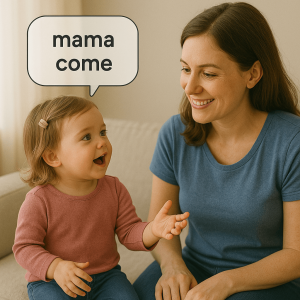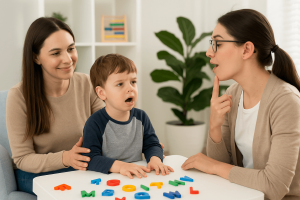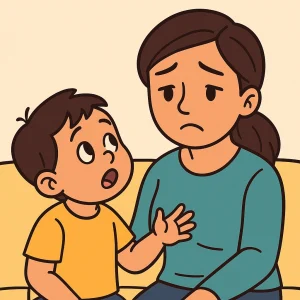The Ultimate Guide to Understanding Toddler Speech Development
By Rajini D
Last Updated: March 19, 2024
Welcome to a journey many parents embark on with curiosity and, sometimes, a hint of worry. Have you noticed your child, with eyes wide open, absorbing every word you say, yet when it comes to speaking, they remain unusually quiet? You’re not alone. This unique stage of development, where toddlers understand far more than they express, is more common than you might think.
This article dives deep into the heart of why some children seem to hear everything but speak little. Our goal is to unravel this mystery and, more importantly, offer you supportive strategies to encourage your child’s speech and communication development. Understanding the difference between listening and speaking, recognizing when and why there might be a delay, and knowing how to foster language skills at home are all vital steps on this path.
Also read: How to Know If Your Kid Needs Speech Therapy?
Understanding Your Quiet Toddler
Receptive Language: The Foundation of Understanding
Receptive language skills refer to a child’s ability to comprehend and process information. This includes understanding words, sentences, and the nuances of language, such as tone and body language. When we talk about a toddler who “speaks little,” we’re often witnessing a child whose receptive language skills are developing at a remarkable pace. They can follow instructions, respond to questions non-verbally, and show understanding of conversations around them. It’s like they’re absorbing everything like a sponge, quietly making sense of the bustling world.
Expressive Language: The Challenge of Speaking
Expressive language skills, on the other hand, are all about producing language. This encompasses speaking words, forming sentences, and using language to express thoughts, feelings, and ideas. It’s where the struggle often lies for our quiet toddlers. Despite their impressive understanding, the journey from brain to mouth isn’t always straightforward. The complexity of coordinating breath, vocal cords, and articulation muscles, all while organizing thoughts and recalling words, is a monumental task for young children.
Receptive vs. Expressive Language Skills
| Skill Type | Description | Examples |
|---|---|---|
| Receptive Language | Refers to a child’s ability to understand and process language from others. This includes understanding words, sentences, and the intent behind the language. | – Following simple instructions like “Please bring me the ball.” – Understanding questions such as “Do you want more milk?” – Recognizing familiar names and objects. |
| Expressive Language | Involves using words, sentences, gestures, and writing to communicate one’s thoughts, needs, and ideas to others. | – Saying “more” or “done” during mealtime. – Using two-word sentences like “big dog.” – Asking questions or expressing desires, like “Want go outside.” |
Why Some Toddlers Speak Little
Several factors can contribute to why some toddlers might understand a lot but speak little. Here are some common reasons, presented without overwhelming you with too much technical jargon:
- Developmental Pace: Just like crawling, walking, and other physical milestones, every child has a unique timeline for language development. Some toddlers might simply be taking their time before they start chatting away.
- Speech or Language Delays: In some cases, children might face challenges with speech clarity or language development, making them less inclined to speak.
- Personality: Yes, personality plays a role too! Some children are naturally more observant and prefer listening over speaking until they’re ready to express themselves fully.
- Overwhelming Choices: With so much to say and not enough words at their disposal, some toddlers might choose to stay silent until they’ve mastered more vocabulary.
Understanding these differences and reasons can provide a sense of relief. It reassures us that our quiet toddlers are on their path, gradually building the bridge between their thoughts and their ability to share them with us verbally.
Common Reasons for Limited Verbal Communication
- Speech Delay: Sometimes, children take a little longer to start speaking. This delay can be in how they produce sounds, form words, or use sentences. While speech delay is relatively common, it’s crucial not to confuse it with a lack of understanding. These toddlers often comprehend much more than they can express.
- Nonverbal Toddler: A nonverbal toddler might communicate through gestures, facial expressions, or other forms of non-spoken communication. This doesn’t necessarily indicate a problem; some children simply prefer these methods until they develop more confidence in their speech abilities.
- Late Talkers: The term ‘late talker’ is often used to describe children who haven’t started speaking by the age expected but show typical development in other areas. These toddlers are soaking up language, understanding the world around them, and might just be waiting for the right moment to start talking.
- Silent Toddler: Similar to late talkers, silent toddlers are those who choose not to speak much. They understand instructions, interact with their environment effectively, and may communicate in non-verbal ways. Their silence is often a phase rather than a cause for concern.
Learn more: Understanding Speech Delay: Causes, Milestones, and Therapy
Recognizing When Your Child Might Need Support
Identifying the need for additional support is crucial in fostering a child’s communication skills. Here are signs that it might be time to seek advice:
- Not Meeting Speech Milestones: If your child isn’t reaching speech development milestones appropriate for their age, such as babbling by a certain month or using words to form short sentences by the time they’re two, it might be worth discussing with a professional.
- Reliance on Gestures Over Words: While gestures are a normal part of development, excessive reliance on them without attempting to vocalize can indicate that your toddler might benefit from some encouragement or support in speech development.
- Frustration or Behavioral Changes: A child who is trying to communicate but can’t find the words might show signs of frustration, such as tantrums or withdrawal. Observing these emotional responses can be a signal that they need help finding their voice.
- Lack of Imitation: Children learn to speak by mimicking the sounds and words they hear. If your toddler shows little interest in copying speech or sounds, this might be an area to explore further.
Explore more on our article Does Speech Therapy Work for Toddlers?
Moving Forward
If you’ve observed any of these signs in your toddler, remember early intervention can be incredibly effective. Starting the conversation with your pediatrician or a speech-language therapist can open the door to supportive strategies tailored to your child’s needs. At Wellness Hub, we understand the unique journey each child and family takes. Our resources and professional network are here to support you, ensuring that finding answers and appropriate support is as seamless as possible.
The Role of Early Intervention
Early intervention cannot be overstated in its importance. Recognizing and addressing speech and communication challenges as soon as they become apparent can significantly alter the trajectory of a child’s communication skills development. It’s about laying the foundation for successful interaction with the world. Early intervention services support not only the child but also the family, equipping parents with the tools and strategies they need to foster their child’s development.
At Wellness Hub, we emphasize the value of seeking expert advice early on. Our platform serves as a comprehensive resource for parents looking for guidance, support, and connections to professionals who can make a real difference in their child’s life. Whether it’s through informative articles, access to speech therapists, or practical tips for everyday activities, Wellness Hub is dedicated to supporting families on this journey.
Know more Early Identification/ Warning Signs in child development
Early Intervention Services and Benefits
| Service Type | Description | Expected Benefit |
|---|---|---|
| Speech Therapy | Focuses on improving a child’s speech and ability to understand and use language, including pronunciation, vocabulary, and sentence formation. | Enhances communication skills, expands vocabulary, improves clarity in speech, and fosters effective expression and understanding. |
| Occupational Therapy | Helps children develop the fine motor skills needed for daily activities, and can also support sensory integration, which impacts communication and social interaction. | Supports independence in daily activities, improves sensory processing, and enhances coordination and social interaction abilities. |
| Physical Therapy | Aims to improve gross motor skills, balance, and coordination, which can indirectly support communication by enabling more active, confident participation in social settings. | Enhances physical strength and mobility, facilitating more engagement in social and communicative activities. |
| Special Education Services | Provides tailored educational strategies and support to meet the unique learning needs of children with developmental delays or disabilities. | Promotes academic success, supports cognitive development, and ensures a supportive learning environment tailored to the child’s needs. |
Encouraging Your Toddler’s Speech at Home
Fostering your toddler’s speech and language development can be woven into the fabric of daily life with simplicity and joy. Here are some actionable tips to help encourage your child’s speech development at home:
- Be a Narrator: Comment on what you and your child are doing throughout the day. This continuous exposure to language provides a rich vocabulary environment for your toddler.
- Pause and Wait: Give your child time to respond during conversations. This pause can encourage them to fill in the silence with attempts at words or gestures, promoting their expressive language skills.
- Expand and Extend: When your toddler uses words or gestures, build on them. If they say “ball,” you can respond with, “Yes, it’s a big red ball!”
- Read Together: Reading is not just about storytelling; it’s a dialogue. Ask questions, point to and name objects, and encourage interaction with the story to make it a two-way conversation.
- Sing Songs and Nursery Rhymes: Music and rhythm are excellent for language development. Singing slows down language, allowing toddlers to catch nuances of sounds and words.
- Play Together: Interactive play is a fantastic way to encourage speech. Play that involves turn-taking, like rolling a ball back and forth, can mimic the back-and-forth nature of conversation.
Also Read: Home-Based Speech Therapy Activities for 1-2 Years Kids
For more in-depth strategies, activities, and professional guidance, Wellness Hub is here to support you every step of the way. Our resources are designed to empower parents with knowledge and practical tips to aid their child’s communication journey from the comfort of home.
By engaging with these tips and utilizing resources like Wellness Hub, you’re not just waiting for speech to happen; you’re actively participating in and nurturing your child’s ability to communicate. This proactive approach can make all the difference, turning everyday moments into opportunities for growth and connection.
Conclusion
In navigating the nuanced journey of speech and language development with our toddlers, we’ve touched upon the vital distinctions between understanding and speaking, delved into the reasons behind limited verbal communication, and underscored the significance of early intervention. This exploration serves as a beacon for parents, guiding them through the complexities of supporting their child’s path to effective communication. Recognizing signs of speech delays and appreciating the divergence between receptive and expressive language skills are key steps toward nurturing a supportive environment for our little ones. Embracing each child’s unique developmental timeline with patience and understanding is not just beneficial—it’s essential.
Wellness Hub remains a steadfast ally for parents on this journey, providing resources, support, and expert advice tailored to each family’s needs. Our commitment to assisting families in fostering their children’s communication skills is unwavering. As we conclude, let us remember that the journey might be quiet, but it’s rich with potential for growth and joy. Your support, love, and encouragement are the pillars upon which your child will build their bridge to communication. With Wellness Hub by your side, you’re never alone on this path, ensuring that every child finds their voice at their own pace, in their own time.
Frequently Asked Questions:
1. What should I do if my toddler understands but doesn’t speak?
If your toddler seems to understand but isn’t speaking yet, it’s important to engage in activities that encourage verbal expression, such as reading together, singing songs, and having interactive playtime. Additionally, monitoring their development and consulting with a pediatrician or speech-language therapist can provide personalized strategies and determine if early intervention services are needed.
2. How can I tell if my child has a speech delay?
Signs of a speech delay in toddlers include not babbling by the age of 12 months, using fewer words than expected for their age group, not putting words together to form sentences by about 2 years old, and showing frustration when trying to communicate. If you notice any of these signs, consider seeking advice from a healthcare professional.
3. Are silent toddlers less intelligent?
Silence or limited verbal communication in toddlers is not an indicator of intelligence. Many children who speak little at a young age have a normal or even advanced understanding of language. They may simply be taking their time to express themselves verbally or prefer other forms of communication.
4. What is early intervention, and how can it help my nonverbal toddler?
Early intervention refers to services and support provided to children who show signs of developmental delays or specific health conditions. For nonverbal toddlers, early intervention might include speech therapy, which can enhance their ability to communicate through tailored exercises and strategies, potentially improving their language skills and confidence.
5. Can late talkers catch up to their peers?
Many late talkers catch up with their peers in terms of language skills, especially with the right support and interventions. Engaging with your child in language-rich activities and, if necessary, working with speech-language professionals can significantly aid in their progress.
6. How can Wellness Hub help with my toddler’s speech development?
Wellness Hub offers a wealth of resources for parents of toddlers experiencing speech delays or communication challenges. From articles filled with tips and advice to connections with speech-language therapists, Wellness Hub supports families in navigating their child’s language development journey, providing tools and guidance every step of the way.
7. What activities can support speech development in toddlers?
Simple, interactive activities can significantly support speech development. Engaging in daily conversations, reading books aloud, playing naming games with objects around the house, singing nursery rhymes, and using gestures or sign language to communicate can all encourage your toddler to speak. Remember, the key is consistent, meaningful interaction.
8. When should I worry about my toddler not talking?
Concerns about your toddler’s speech development might arise if they have not said their first word by 15 to 18 months, do not consistently use a variety of words by 18 to 24 months, or are not putting two words together by the age of 2. However, every child develops at their own pace.
9. Can environmental factors affect a toddler’s speech development?
Yes, environmental factors can play a significant role in a toddler’s speech development. A language-rich environment where children are engaged in conversations, read to, and encouraged to express themselves can foster speech and language skills.
10. How does screen time affect my toddler’s language development?
Screens can hurt your toddler’s language skills. They replace playtime with caregivers and friends, which is crucial for learning to talk. Limit screen time and focus on talking, reading, and playing together instead!
About the Author:
Rajini Darugupally
M.Sc., Speech-Language Pathologist (9+ years of experience)
Rajini is a passionate Speech-Language Pathologist with over 9 years of experience. She specializes in both treating children with developmental speech and language disorders and adult rehabilitation.
Currently, at Wellness Hub, she thrives in a team environment that values innovation, compassion, and achieving results for their clients.
Connect with Rajini to learn more about how she can help you or your loved one find their voice.
Book your Free Consultation Today
Parent/Caregiver Info:
Client’s Details:
* Error Message








